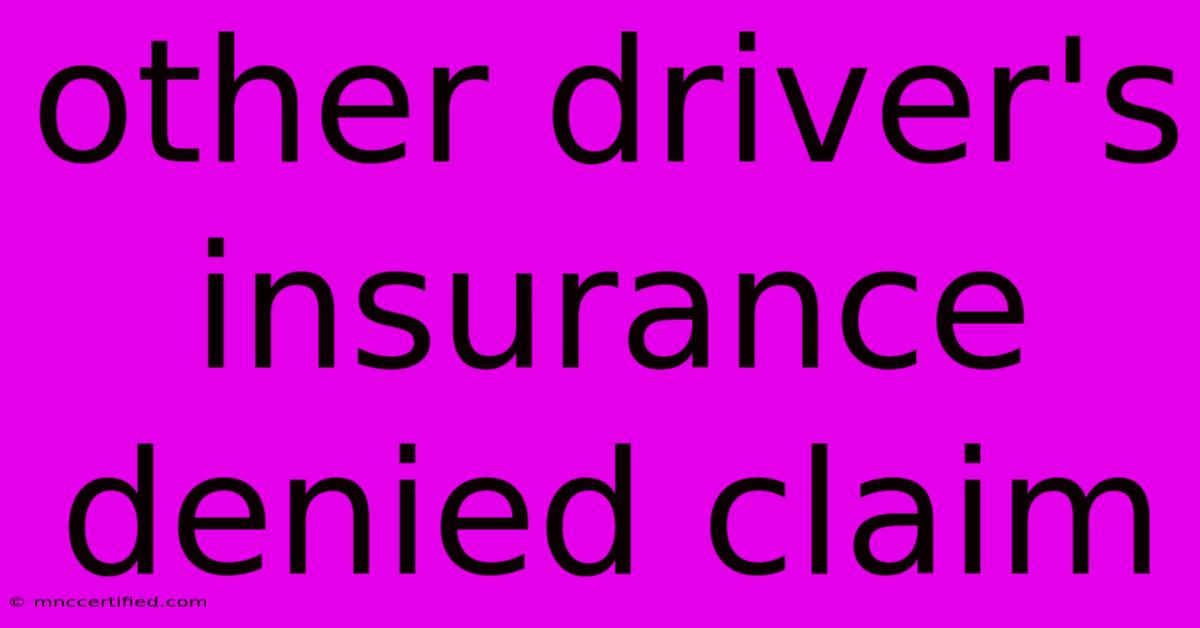Other Driver's Insurance Denied Claim

Table of Contents
When the Other Driver's Insurance Denies Your Claim: What You Can Do
Being in a car accident is stressful enough. But when the other driver's insurance company denies your claim, the frustration and anxiety can escalate quickly. This can leave you feeling helpless and unsure of what steps to take next. Don't worry, you're not alone. This guide will walk you through the process of navigating a denied claim and provide strategies for getting the compensation you deserve.
Understanding Why Claims Are Denied
Insurance companies are businesses, and their primary objective is to make a profit. This often means scrutinizing claims closely and denying them for various reasons, including:
- Policy Exclusions: Your claim might fall outside the coverage provided by the other driver's policy. This could be due to factors like driving without a valid license or operating a vehicle without the proper insurance.
- Lack of Evidence: Insufficient proof of the other driver's negligence or the severity of your injuries could lead to denial. This might involve not having enough eyewitness testimony or missing medical documentation.
- Misinterpretation of Events: There might be discrepancies between your account of the accident and the other driver's version, leading the insurance company to doubt your claim.
- Fraudulent Claims: Insurance companies are vigilant in identifying fraudulent claims, which could include exaggerating injuries or claiming damages that didn't occur.
What to Do When Your Claim is Denied
1. Review the Denial Letter Carefully: Understand the specific reasons provided for the denial. Note the policy language they cite as justification.
2. Gather More Evidence: If the denial is based on lack of evidence, take immediate action to gather additional information, such as:
- Police Report: Obtain a copy of the accident report, as it serves as an official record of the incident.
- Medical Documentation: Ensure you have thorough medical records documenting your injuries and treatment.
- Eyewitness Statements: Get statements from anyone who witnessed the accident.
- Photographs and Videos: Capture images and videos of the accident scene, vehicle damage, and your injuries.
3. File an Appeal: Most insurance companies have a process for appealing a denied claim. Be sure to follow their procedures carefully. Include all supporting evidence and a clear, concise explanation of why you believe the denial was unjustified.
4. Consult with an Attorney: An experienced car accident lawyer can help you navigate the complex legal process and ensure your rights are protected. They can:
- Review the denial letter and identify legal arguments for appeal.
- Negotiate with the insurance company on your behalf.
- File a lawsuit if necessary.
5. Explore Your Own Coverage: If the other driver's insurance denies your claim, you might be able to file a claim under your own policy's uninsured/underinsured motorist coverage. This option protects you in situations where the other driver lacks sufficient coverage or is uninsured.
Preventing Future Denials
- Maintain a Clean Driving Record: Good driving habits and avoiding traffic violations help reduce your risk of being involved in an accident.
- Have Adequate Insurance Coverage: Ensure your policy provides sufficient coverage to protect you in the event of an accident.
- Document Everything: Keep detailed records of all communication with the insurance company and any supporting documentation related to your claim.
Remember: Don't hesitate to seek professional legal guidance if you're struggling to navigate a denied claim. An experienced attorney can help you fight for the compensation you deserve.

Thank you for visiting our website wich cover about Other Driver's Insurance Denied Claim. We hope the information provided has been useful to you. Feel free to contact us if you have any questions or need further assistance. See you next time and dont miss to bookmark.
Featured Posts
-
Insurance For Jet Ski Rental Business
Nov 10, 2024
-
Is Critical Illness Insurance Pre Tax
Nov 10, 2024
-
Does Good Feet Store Accept Insurance
Nov 10, 2024
-
How Long Can You Be Held Without Bond
Nov 10, 2024
-
Ameritas Disability Insurance Reviews
Nov 10, 2024